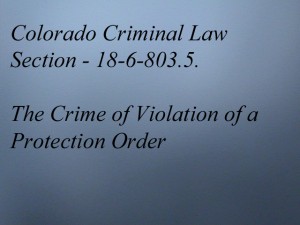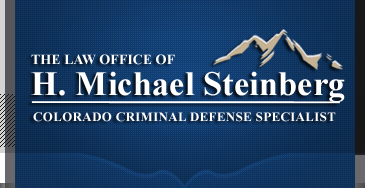






 Violation of a Protection Order 18-6-803.5 (2) (a).
Violation of a Protection Order 18-6-803.5 (2) (a).
This web page contains the elements of the Colorado Crime of Violation of a protection order 18-6-803.5 (2) (a).
These are only the basic elements of these crimes – to fully understand a crime with which you are charged you will need a much greater understanding of Colorado Criminal Law.
This web site is designed to empower criminal defendants by helping them understand every phase of the criminal justice process. It also addresses the different types of defenses and strategies that exist in the Colorado Criminal Justice System.
If you are charged with a crime and seek to understand the new world you have entered – you need to understand that criminal laws and procedures can be so complex that even judges can get them wrong.
Domestic Violence – Violation of a protection order 18-6-803.5 (2) (a).
18-6-803.5. Crime of violation of a protection order – penalty – peace officers’ duties.
(1) A person commits the crime of violation of a protection order if, after the person has been personally served with a protection order that identifies the person as a restrained buy tramadol pharmacy person or otherwise has acquired from the court or law enforcement personnel actual knowledge of the contents of a protection order that identifies the person as a restrained person, the person:
(a) Contacts, harasses, injures, intimidates, molests, threatens, or touches the protected person or protected property, including an animal, identified in the protection order or enters or remains on premises or comes within a specified distance of the protected person, protected property, including an animal, or premises or violates any other provision of the protection order to protect the protected person from imminent danger to life or health, and such conduct is prohibited by the protection order;
(b) Except as permitted pursuant to section 18-13-126(1)(b), hires, employs, or otherwise contracts with another person to locate or assist in the location of the protected person; or
(c) Violates a civil protection order issued pursuant to section 13-14-102(22), C.R.S., or pursuant to section 18-1-1001(9) by:
(I) Possessing or attempting to purchase or receive a firearm or ammunition while the protection order is in effect; or
(II) Failing to timely file a receipt or written statement with the court as described in section 13-14-102(22)(i), C.R.S., or in section 18-1-1001(9)(i) or 18-6-801(8)(i).
(1.5) As used in this section:
(a) “Protected person” means the person or persons identified in the protection order as the person or persons for whose benefit the protection order was issued.
(a.5)(I) “Protection order” means any order that prohibits the restrained person from contacting, harassing, injuring, intimidating, molesting, threatening, or touching any protected person or protected animal, or from entering or remaining on premises, or from coming within a specified distance of a protected person or protected animal or premises or any other provision to protect the protected person or protected animal from imminent danger to life or health, that is issued by a court of this state or a municipal court, and that is issued pursuant to:
(A) Article 14 of title 13, C.R.S., section 18-1-1001, section 19-2-707, C.R.S., section 19-4-111, C.R.S., or rule 365 of the Colorado rules of county court civil procedure;
(B) Sections 14-4-101 to 14-4-105, C.R.S., section 14-10-107, C.R.S., section 14-10-108, C.R.S., or section 19-3-316, C.R.S., as those sections existed prior to July 1, 2004;
(C) An order issued as part of the proceedings concerning a criminal municipal ordinance violation; or
(D) Any other order of a court that prohibits a person from contacting, harassing, injuring, intimidating, molesting, threatening, or touching any person, or from entering or remaining on premises, or from coming within a specified distance of a protected person or premises.
(II) For purposes of this section only, “protection order” includes any order that amends, modifies, supplements, or supersedes the initial protection order. “Protection order” also includes any restraining order entered prior to July 1, 2003, and any foreign protection order as defined in section 13-14-110, C.R.S.
(b) “Registry” means the computerized information system created in section 18-6-803.7 or the national crime information center created pursuant to 28 U.S.C. sec. 534.
(c) “Restrained person” means the person identified in the order as the person prohibited from doing the specified act or acts.
…
(2)(a) Violation of a protection order is a class 2 misdemeanor; except that, if the restrained person has previously been convicted of violating this section or a former version of this section or an analogous municipal ordinance, or if the protection order is issued pursuant to section 18-1-1001, the violation is a class 1 misdemeanor.
(a.5) A second or subsequent violation of a protection order is an extraordinary risk crime that is subject to the modified sentencing range specified in section 18-1.3-501(3).
…
(c) Nothing in this section shall preclude the ability of a municipality to enact concurrent ordinances. Any sentence imposed for a violation of this section shall run consecutively and not concurrently with any sentence imposed for any crime which gave rise to the issuing of the protection order.
(3)(a) Whenever a protection order is issued, the protected person shall be provided with a copy of such order. A peace officer shall use every reasonable means to enforce a protection order.
(b) A peace officer shall arrest, or, if an arrest would be impractical under the circumstances, seek a warrant for the arrest of a restrained person when the peace officer has information amounting to probable cause that:
(I) The restrained person has violated or attempted to violate any provision of a protection order; and
(II) The restrained person has been properly served with a copy of the protection order or the restrained person has received actual notice of the existence and substance of such order.
(c) In making the probable cause determination described in paragraph (b) of this subsection (3), a peace officer shall assume that the information received from the registry is accurate. A peace officer shall enforce a valid protection order whether or not there is a record of the protection order in the registry.
(d) The arrest and detention of a restrained person is governed by applicable constitutional and applicable state rules of criminal procedure. The arrested person shall be removed from the scene of the arrest and shall be taken to the peace officer’s station for booking, whereupon the arrested person may be held or released in accordance with the adopted bonding schedules for the jurisdiction in which the arrest is made, or the arrested person may be taken to the jail in the county where the protection order was issued. The law enforcement agency or any other locally designated agency shall make all reasonable efforts to contact the protected party upon the arrest of the restrained person. The prosecuting attorney shall present any available arrest affidavits and the criminal history of the restrained person to the court at the time of the first appearance of the restrained person before the court.
(e) The arresting agency arresting the restrained person shall forward to the issuing court a copy of such agency’s report, a list of witnesses to the violation, and, if applicable, a list of any charges filed or requested against the restrained person. The agency shall give a copy of the agency’s report, witness list, and charging list to the protected party. The agency shall delete the address and telephone number of a witness from the list sent to the court upon request of such witness, and such address and telephone number shall not thereafter be made available to any person, except law enforcement officials and the prosecuting agency, without order of the court.
(4) If a restrained person is on bond in connection with a violation or attempted violation of a protection order in this or any other state and is subsequently arrested for violating or attempting to violate a protection order, the arresting agency shall notify the prosecuting attorney who shall file a motion with the court which issued the prior bond for the revocation of the bond and for the issuance of a warrant for the arrest of the restrained person if such court is satisfied that probable cause exists to believe that a violation of the protection order issued by the court has occurred.
(5) A peace officer arresting a person for violating a protection order or otherwise enforcing a protection order shall not be held criminally or civilly liable for such arrest or enforcement unless the peace officer acts in bad faith and with malice or does not act in compliance with rules adopted by the Colorado supreme court.
(6)(a) A peace officer is authorized to use every reasonable means to protect the alleged victim or the alleged victim’s children to prevent further violence. Such peace officer may transport, or obtain transportation for, the alleged victim to shelter. Upon the request of the protected person, the peace officer may also transport the minor child of the protected person, who is not an emancipated minor, to the same shelter if such shelter is willing to accept the child, whether or not there is a custody order or an order allocating parental responsibilities with respect to such child or an order for the care and control of the child and whether or not the other parent objects. A peace officer who transports a minor child over the objection of the other parent shall not be held liable for any damages that may result from interference with the custody, parental responsibilities, care, and control of or access to a minor child in complying with this subsection (6).
(b) For purposes of this subsection (6), “shelter” means a battered women’s shelter, a friend’s or family member’s home, or such other safe haven as may be designated by the protected person and which is within a reasonable distance from the location at which the peace officer found the victim.
(7) The protection order shall contain in capital letters and bold print a notice informing the protected person that such protected person may either initiate contempt proceedings against the restrained person if the order is issued in a civil action or request the prosecuting attorney to initiate contempt proceedings if the order is issued in a criminal action.
(8) A protection order issued in the state of Colorado shall contain a statement that:
(a) The order or injunction shall be accorded full faith and credit and be enforced in every civil or criminal court of the United States, another state, an Indian tribe, or a United States territory pursuant to 18 U.S.C. sec. 2265;
(b) The issuing court had jurisdiction over the parties and subject matter; and
(c) The defendant was given reasonable notice and opportunity to be heard.
(9) A criminal action charged pursuant to this section may be tried either in the county where the offense is committed or in the county in which the court that issued the protection order is located, if such court is within this state.
Violating a protection order after having been previously convicted of violating a protection order or an analogous municipal ordinance, or violating a protection order issued pursuant to section 18-1-1001 concerning mandatory protection orders is a class 1 misdemeanor.
Other Articles of Interest:
- The Wrong Person Is Arrested – Understanding Victim Defendant Representation In Colorado Domesitic Violence Cases
- Colorado Criminal Law – The Rules of Discovery in Colorado – Getting The Information You Need To Defend Your Clients
- Colorado Gun Laws – There Are Many
- Your Constitutional Rights
- Colorado Domestic Violence Criminal Defense Issues






















